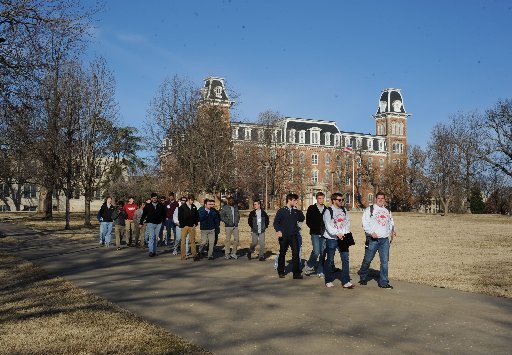FAYETTEVILLE -- An appellate court filing by the University of Arkansas seeks to undercut the basis for lawsuits seeking monetary damages in Title IX lawsuits like one filed against the university last year.
A former student claimed the university acted with "deliberate indifference" when she reported being raped by another student in 2014. The student's lawsuit, filed in U.S. District Court in Fayetteville, states that UA violated Title IX, the federal law that prohibits sex-based discrimination at schools that receive federal funding.
Other schools have been sued by students alleging Title IX violations related to how schools respond to reports of sexual assault. Some cases resulted in high-profile settlements, like when Florida State University in 2016 announced a $950,000 settlement in a case filed by a former student.
The suit against UA-Fayetteville and the university system's board of trustees alleges that the university improperly handled a campus disciplinary process, failed to properly train a disciplinary panel hearing the case and did not implement policies to clearly set out "the procedure for trainers, coaches and student-athletes to follow when a student-athlete is the victim of sexual assault."
The lawsuit asked for damages, punitive damages, attorneys' and expert fees and "other relief of which this Court deems just and proper."
Attorneys for UA sought to have the case dismissed by U.S. District Judge P.K. Holmes III, but he ruled in November that "dismissal is inappropriate at this stage," with the university then taking its argument to the 8th U.S. Circuit Court of Appeals.
In a brief filed Jan. 30, university attorneys cited a 2011 U.S. Supreme Court ruling and the legal concept of sovereign immunity to argue for dismissal of the former student's case.
Questions of sovereign immunity involve, in part, whether governments and government employees should be shielded from lawsuits. While the U.S. Congress can override states' immunity or induce states to waive immunity voluntarily, this must be done via a "clear statement," attorneys for the university argued.
"No court has, to our knowledge, ever performed the requisite clear-statement analysis in a lawsuit involving a Title IX claim for monetary damages against a State institution. Under such an analysis, dismissal of this civil action is compelled," UA states in the filing.
A ruling in a 2011 Supreme Court case called Sossamon v. Texas -- which did not involve Title IX but a Texas inmate's lawsuit under what's known as the Religious Land Use and Institutionalized Persons Act -- bolsters their argument, UA states in the court document.
Erin Buzuvis, a law professor at Western New England University School of Law and co-founder of Title IX Blog, said in an email that the U.S. Supreme Court found in the Sossamon case that a state taking federal money did not constitute a waiver of sovereign immunity as it relates to the Religious Land Use and Institutionalized Persons Act.
This "could be relevant in the Title IX context as well," Buzuvis wrote. While in the past there have been several examples of courts rejecting state university arguments of sovereign immunity in Title IX cases, "it's hard to find many examples" after the 2011 Supreme Court ruling, she said.
But another legal issue involves the relationship between Title IX and the 14th Amendment, Buzuvis said. Federal lawmakers have the power to revoke a state's sovereign immunity, or abrogate it, to protect rights under the 14th Amendment to the U.S. Constitution, according to legal theory, Buzuvis said. The 14th Amendment, which protects the rights to liberty and equal protection under the law, was ratified after the Civil War.
"This is not universally held, but some courts have recognized Congress's abrogation of state's sovereign immunity in Title IX cases on the grounds the Congress essentially used its 14th [Amendment] power along with its spending clause power when it passed Title IX," she wrote, calling the UA case "one to watch."
Doriane Lambelet Coleman, a law professor at Duke Law School, said the question of sovereign immunity "could be fact-specific and state-specific," adding that a state may have waived its immunity in various ways. But the case could end up setting a legal precedent, she said.
George Rozzell, an attorney for the former student, said a response is being prepared and will be filed with the appellate court.
Metro on 02/04/2017
